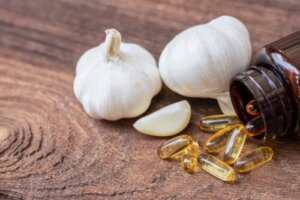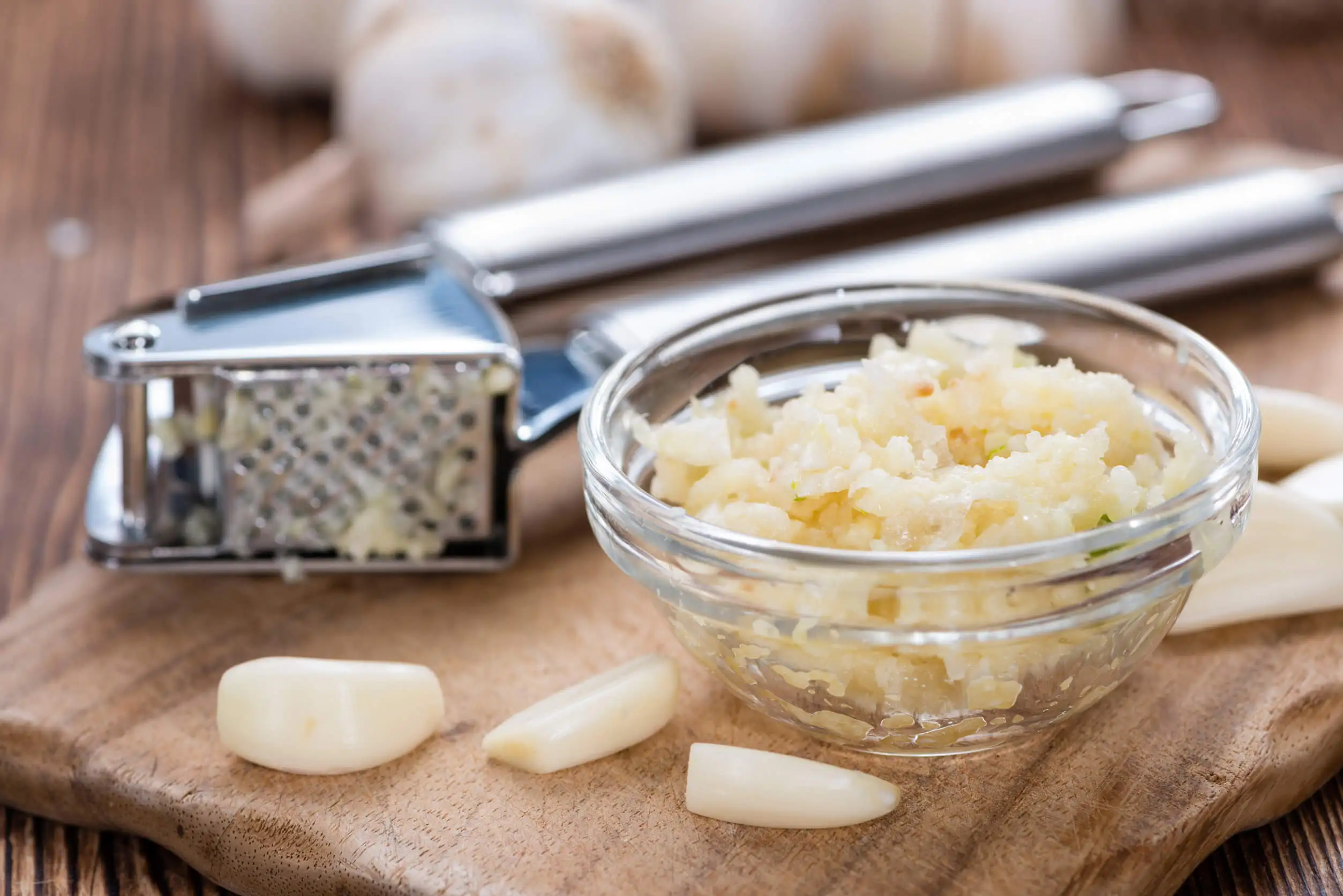Garlic Capsules: Benefits and Recommendations


Written and verified by the nutritionist Maria Patricia Pinero Corredor
Garlic has traveled the world in its passage through history as a food, condiment, and supplement. All this is thanks to its culinary and therapeutic properties. For example, garlic capsules can be used as an adjuvant for cardiovascular disease prevention.
Its active components have many health benefits. The most effective is the sulfur compounds, which help with its antioxidant, antimicrobial, and anti-inflammatory potential.
Due to its importance, there are different forms of presentation in the market. Garlic capsules are among the most commonly used.
How much should be consumed per day, and what recommendations are appropriate to make the best use of them? Stay with us to learn how best to incorporate garlic capsules into your diet!
What type of vegetable is garlic?
Garlic is a plant whose scientific name is Allium sativum, which means “hot crop” or simply “hot.” It has its origin in Central Asia. From there, it spread to Asia Minor and Egypt, and from there to all of Europe, and then to Africa and America.
As a vegetable, it’s a bulb that belongs to the Liliaceae family. It’s composed of several bulblets, called “teeth,” which are attached to a base. Each clove is enveloped by an inner tunic and the entire bulb by an outer one.
In addition, the bulb is the storage organ of the plant as it contains carbohydrates and proteins. It has several active components.
Active components
In addition to water and carbohydrates, such as fructose, garlic contains sulfur compounds, fiber, and free amino acids. Vitamin C, phenolic compounds, polyphenols, and phytosterols stand out among its nutrients. Meanwhile, its most important minerals are potassium, phosphorus, magnesium, sodium, iron, and calcium.
Its active sulfur compounds are especially relevant. Here, it’s worth mentioning allixin, allicin, alliin, thiosulfinate, diallyl di- and trisulfide, triosulfinate, allyl mercaptocysteine, and S-allylcysteine (SAC).
Garlic also contains hormones that act similarly to human hormones. In addition, several amino acids have been isolated, such as histidine, methionine, threonine, tryptophan, and valine.
Like this article? You may also like to read: How to Make a Garlic and Lemon Ointment for Varicose Veins
The benefits of garlic capsules
Garlic capsules are supplements containing a unit dose of one or more active ingredients. They’re intended for oral administration. When acquiring them, it’s necessary to verify how the raw material was obtained. Their effectiveness depends on this.
For example, raw garlic retains more active ingredients than cooked garlic. When it’s fresh, it’s more potent than older, processed, or preserved types of garlic.

Garlic capsules have an antioxidant effect
Some studies have emphasized the antioxidant effect of Allium sativum extract. When consumed, a decrease in the production of free radicals has been observed. These radicals oxidize cells, leading to damage to their functioning and accelerating aging.
It has also been observed that frequent garlic consumption leads to an increase in antioxidant factors, such as glutathione and the enzyme superoxide dismutase. Both protect lipoproteins from oxidation and help prevent cardiovascular diseases.
The components with the highest antioxidant activity in garlic are allicin and S-allyl cysteine or SAC.
Garlic reduces blood lipid levels
Some research has concluded that garlic modifies blood lipids, as it’s able to counteract the increase of triglycerides in the blood. It’s able to reduce cholesterol levels by 12% after four weeks of treatment.
The maximum decrease in cholesterol has been observed with raw garlic at a dose of 10 grams per day, or garlic oil, at a dose of 8 milligrams per day.
It can regulate blood pressure
The bioactive compounds in garlic relax blood vessels, improve blood flow, strengthen the vascular wall, and lower blood pressure. Garlic is also able to reduce blood clot formation by inhibiting platelet aggregation.
Its high antiatherosclerotic potential has promoted its use in the prevention of cardiovascular diseases.
It has a neuroprotective effect
Garlic extract may have neuroprotective effects, mainly due to the antioxidant properties of S-allylcysteine. This component may improve cognitive decline in disorders linked to oxidative stress.
It’s therefore recommended in the treatment of Alzheimer’s disease, Parkinson’s disease, strokes, and Huntington’s chorea. The neuroprotective effect promotes memory and learning.
Garlic has an immunomodulatory and anti-inflammatory role
Some studies have found that garlic extract improves the immune system, which is linked to the reduction of inflammation. The most active compounds are sulfur compounds, and the effective dose for enhancing an immune response in humans is 1.8 to 10 grams of garlic per day.
Garlic components also stimulate the production of the body’s lines of defense. For example, lymphocytes, macrophages, and “killer” cells. They also increase immunostimulatory cytokines.
This immunomodulatory activity is effective in aiding in the treatment of flu, colds, and bronchitis . Likewise, it has also been associated with the mechanism of cancer prevention.
Garlic has antimicrobial and antifungal properties
The anti-infective properties of garlic have been known since ancient times. It presents antimicrobial activity against different disease-producing bacteria, such as E. coli, Salmonella, and H. pylori, among others. Garlic has shown significant inhibitory effects against fungi, types of yeast, and parasites.
We think you may be interested in reading this, too: How To Reduce Cholesterol with Garlic: 3 Home Remedies
Recommendations on garlic intake
Garlic can be found in 5 different forms on the market:
- Fresh and raw
- As an essential oil
- As a macerated oil
- Powdered
- Aged as garlic extract
These preparations are marketed as capsules or tablets. They have a coating to avoid decomposition of their active components and affectation of the breath.
The European Medicines Agency establishes the following doses for adults and the elderly, according to the type of preparation contained in the capsule:
- With garlic powder: A single dose of 300 to 750 milligrams of daily doses between 900 to 1380 milligrams divided between 3 to 5 intakes
- Liquid extract: A single dose between 110 to 220 milligrams, four times a day, and as a daily dose between 440 to 880 milligrams
- Dry garlic extract: A dose of 100 to 200 milligrams, once or twice a day, or daily doses of 100 to 400 milligrams is recommended
It’s important to read the label and follow the indications of your physician or nutritionist to adapt the dosage to each particular case.
Garlic is part of natural remedies that have been known since ancient times. The supplement industry has produced more commercial versions for its use.
Possible adverse effects of garlic capsules
The frequency with which some adverse effects may occur is still unknown. However, the following are mentioned as the most common:
- Bad breath and body odor
- Headache, dizziness, and profuse sweating
- Flatulence, stomach upset, and diarrhea
- Altered platelet function with possible bleeding
- Changes in intestinal microflora
- Low blood sugar levels
Contraindications of garlic capsules
Garlic capsules should be avoided during certain physiological states, such as pregnancy and lactation. In the latter case, it may alter the taste of breast milk.
It should also be omitted in patients with bleeding problems, digestive disorders, suffering from low blood pressure, and those who are planning on getting a surgery.
Nor should these capsules be taken with oral anticoagulants in conjunction, such as warfarin. The same goes for antihypertensives, such as lisinopril, or analgesics, such as paracetamol.
Is it recommended to incorporate garlic capsules into healthy diets?
The answer to this question is yes. In healthy diets, we usually use garlic as a condiment, so the amounts to be ingested will not always be sufficient to enjoy some of the aforementioned benefits.
However, it’s advisable to only take garlic capsules under the guidance of a health professional who can indicate the best preventive doses. These will depend on the presentation of the capsule.
However, the best types of garlic capsules are the most concentrated ones. A garlic extract in doses of 100 to 220 milligrams distributed in 2 to 4 daily intakes is sufficient.
All cited sources were thoroughly reviewed by our team to ensure their quality, reliability, currency, and validity. The bibliography of this article was considered reliable and of academic or scientific accuracy.
- Tránsito López Luengo. El ajo propiedades farmacológicas e indicaciones terapéuticas. Offarm: farmacia y sociedad, ISSN 0212-047X, Vol. 26, Nº. 1 (ENE), 2007, págs. 78-81. Disponible en: https://dialnet.unirioja.es/servlet/articulo?codigo=5324419
- Rahman, M.M. & Fazlic, V. & Saad, N.W.. (2012). Antioxidant properties of raw garlic (Allium sativum) extract. 19. 589-591. Disponible en: http://www.ifrj.upm.edu.my/19%20(02)%202012/(32)IFRJ-2012%20Rahman.pdf
- Dra. Milenys González. Maza, Dra. Greta Guerra Ibañez , Dra. Julia Carolina Maza Hernández, Dra. Aliena Cruz Dopico. Revisión bibliográfica sobre el uso terapéutico del ajo. Revista Cubana de Medicina Física y Rehabilitación 2014;6(1):61-71. Disponible en: https://www.medigraphic.com/pdfs/revcubmedfisreah/cfr-2014/cfr141g.pdf
- García Gómez L. Jacinto, Sánchez-Muniz Francisco J.. Revisión: Efectos cardiovasculares del ajo (Allium sativum). ALAN [Internet]. 2000 Sep [citado 2022 Jul 02] ; 50( 3 ): 219-229. Disponible en: http://ve.scielo.org/scielo.php?script=sci_arttext&pid=S0004-06222000000300002&lng=es.
- Colín-González, A.L., Santana, R.A., Silva-Islas, C.A., et al. The Antioxidant Mechanisms Underlying the Aged Garlic Extract- and S-Allylcysteine-Induced Protection. Ox. Med. and cell. longevity. (2012) 1-16. Disponible en: https://www.ncbi.nlm.nih.gov/pmc/articles/PMC3363007/
- Castillo García, E., y Martínez Solís, I. Manual de fitoterapia (2016). 2º edición, 166-169, 449-450. Barcelona: Elsevier. Disponible en: https://www.elsevier.com/books/manual-de-fitoterapia/978-84-9113-686-6
- Sánchez Domínguez, E. M., Rojas Pérez, S. y Agüero Batista, N. N. Investigaciones actuales del empleo de Allium sativum en medicina. Rev. Eléc. Dr. Zoilo E., M. Vidaurreta (2016) 41 (3). Disponible en: https://redib.org/Record/oai_articulo823123-investigaciones-actuales-del-empleo-de-allium-sativum-en-medicina
- European Medicines Agency. EMA. Committee on Herbal Medicinal Products. (HMPC). Assessment report on Allium sativum L., bulbus (2016) https://www.ema.europa.eu/en/documents/herbal-report/draft-assessment-reportallium-sativum-l-bulbus_en.pdf
- Alonso, J. Tratado de fitofármacos y nutracéuticos. (2007) 87-97. Rosario (Argentina): Editorial Corpus. Disponible en: https://www.edicionesjournal.com/Papel/9789871860630/Tratado+de+Fitof%C3%A1rmacos+y+Nutrac%C3%A9uticos+Ed+2%C2%BA
- European Medicines Agency [sede Web]. Londres: Committee on Herbal Medicinal Products; 2013 [acceso en 12 de mayo de 2019]. European Union Herbal Monograph on Allium sativum L., bulbus. Disponible en: https://www.ema.europa.eu/en/documents/herbal-monograph/draft-european-unionherbal-monograph-allium-sativum-l-bulbus_en.pdf
- RxList [sede Web]. EEUU: RxList; 2019 [acceso 13 de mayo de 2019]. Garlic. Disponible en: https://www.rxlist.com/garlic/supplements.htm
This text is provided for informational purposes only and does not replace consultation with a professional. If in doubt, consult your specialist.








